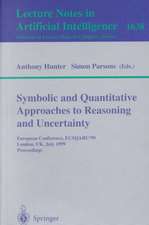Game Theory and Decision Theory in Agent-Based Systems: Multiagent Systems, Artificial Societies, and Simulated Organizations, cartea 5
Editat de Simon D. Parsons, Piotr Gymtrasiewicz, Michael Wooldridgeen Limba Engleză Hardback – 30 iun 2002
- Selecting Partners;
- Evolution of Agents with Moral Sentiments in an IPD Exercise;
- Dynamic Desires;
- Emotions and Personality;
- Decision-Theoretic Approach to Game Theory;
- Shopbot Economics;
- Finding the Best Way to Join in;
- Shopbots and Pricebots in Electronic Service Markets;
- Polynomial Time Mechanisms;
- Multi-Agent Q-learning and Regression Trees;
- Satisficing Equilibria;
- Investigating Commitment Flexibility in Multi-agent Contracts;
- Pricing in Agent Economies using Multi-agent Q-learning;
- Using Hypergames to Increase Planned Payoff and Reduce Risk;
- Bilateral Negotiation with Incomplete and Uncertain Information;
- Robust Combinatorial Auction Protocol against False-name Bids.
| Toate formatele și edițiile | Preț | Express |
|---|---|---|
| Paperback (1) | 1277.57 lei 43-57 zile | |
| Springer Us – 31 oct 2012 | 1277.57 lei 43-57 zile | |
| Hardback (1) | 1282.18 lei 43-57 zile | |
| Springer Us – 30 iun 2002 | 1282.18 lei 43-57 zile |
Preț: 1282.18 lei
Preț vechi: 1602.72 lei
-20% Nou
Puncte Express: 1923
Preț estimativ în valută:
245.35€ • 256.81$ • 204.20£
245.35€ • 256.81$ • 204.20£
Carte tipărită la comandă
Livrare economică 31 martie-14 aprilie
Preluare comenzi: 021 569.72.76
Specificații
ISBN-13: 9781402071157
ISBN-10: 1402071159
Pagini: 420
Ilustrații: XXXIII, 379 p.
Dimensiuni: 155 x 235 x 28 mm
Greutate: 0.71 kg
Ediția:2002
Editura: Springer Us
Colecția Springer
Seria Multiagent Systems, Artificial Societies, and Simulated Organizations
Locul publicării:New York, NY, United States
ISBN-10: 1402071159
Pagini: 420
Ilustrații: XXXIII, 379 p.
Dimensiuni: 155 x 235 x 28 mm
Greutate: 0.71 kg
Ediția:2002
Editura: Springer Us
Colecția Springer
Seria Multiagent Systems, Artificial Societies, and Simulated Organizations
Locul publicării:New York, NY, United States
Public țintă
ResearchCuprins
1 Game Theory and Decision Theory.- 1 Introduction.- 2 Decision Theory.- 3 Game Theory.- 4 The Prisoner’s Dilemma.- 5 Summary.- 2 Selecting Partners.- 1 Introduction.- 2 A Sample Problem.- 3 Coalition Formation.- 4 Payoff-structures of Partnerships.- 5 Selecting the Potentially most Beneficial Partnership for Limited Interactions.- 6 An Example Evaluation.- 7 Comparative Evaluation with a Decision Mechanism for Infinite Interactions.- 8 Evaluation Scenario.- 9 Experimental Results.- 10 Conclusions.- 3 Evolution of Agents with Moral Sentiments in an IPD Exercise.- 1 Introduction.- 2 Moral Sentiments in the Iterated Prisoner’s Dilemma.- 3 The Unwitting Benefits of Altruism.- 4 An Evolutionary Setting for the Simulations.- 5 Playing with Moral Sentiments Secures the Survival of the Group.- 6 A Case for Benevolence in Agents.- 7 Conclusions.- 4 Dynamic Desires.- 1 Introduction.- 2 Utilities, Desires and Goals.- 3 An Example from Negotiation.- 4 Dynamic Logic.- 5 Future Research.- 6 Concluding Remarks.- 5 Emotions and Personality.- 1 Introduction.- 2 Decision—Theoretic Preliminaries.- 3 Emotional States and Personality.- 4 Conclusions and Future Work.- 5 Acknowledgements.- 6 Decision-Theoretic Approach to Game Theory.- 1 Background on Decision—Theoretic Approach to Game Theory.- 2 Knowledge Base Design.- 3 RMM’s Solution Method.- 4 Rational Communication 109 5 Experiments in Air Defense Domain.- 6 Conclusions.- 7 Shopbot Economics.- 1 Introduction.- 2 Model.- 3 Sellers.- 4 Buyers.- 5 Shopbot.- 6 Related Work.- 7 Conclusions and Future Work.- Appendix: No Pure Strategy Nash Equilibrium.- 8 Finding the Best Way to Join in.- 1 Introduction.- 2 Game Theoretic Foundations.- 3 The Accession Game.- 4 Solving More General Games.- 5 Conclusions.- 9 Shopbots and Pricebots inElectronic Service Markets.- 1 Introduction and Definitions.- 2 Our Model of an Electronic Service Market.- 3 Comparisons.- 4 Related Literature.- 5 Conclusions.- Appendix: The Derivation of Equilibrium for the XX Market Configuration.- 10 Polynomial Time Mechanisms.- 1 Introduction.- 2 Mechanism Design.- 3 Polynomial Time Mechanisms.- 4 Dominant Strategy Implementation.- 5 Nash Implementation.- 6 Upper Bounds on Approximability.- 7 Conclusions.- 11 Multi-Agent Q-learning and Regression Trees.- 1 Introduction.- 2 Model Agent Economies.- 3 Single and Multi-Agent Q-learning.- 4 Q-learning with Regression Trees.- 5 Results.- 6 Conclusions.- 12 Satisficing Equilibria.- 1 Introduction.- 2 A Comparative Paradigm.- 3 Praxeic Utility.- 4 Multi-Agent Systems.- 5 Satisficing Games.- 6 Summary and Discussion.- 13 Investigating Commitment Flexibility in Multi-agent Contracts.- 1 Introduction.- 2 The Scenario.- 3 Some Analysis of Special Cases.- 4 Empirical Work.- 5 Conclusions and Further Work.- 14 Pricing in Agent Economies using Multi-agent Q-learning.- 1 Introduction.- 2 Model Agent Economies.- 3 Single-agent Q-learning.- 4 Multi-agent Q-learning.- 5 Conclusions.- 15 Using Hypergames to Increase Planned Payoff and Reduce Risk.- 1 Introduction.- 2 Discussion.- 3 Results.- 4 Conclusions.- 16 Bilateral Negotiation with Incomplete and Uncertain Information.- 1 Introduction.- 2 The Application Area.- 3 The Negotiation Mechanism.- 4 Evaluation.- 5 Related Work on Negotiation.- 6 Conclusions.- 17 Robust Combinatorial Auction Protocol against False-name Bids.- 1 Introduction.- 2 Generalized Vickrey Auction Protocol (GVA).- 3 Robust Protocol against False-name Bids.- 4 Proof of Incentive Compatibility.- 5 Evaluation.- 6 Discussion.- 7 Conclusions.






































